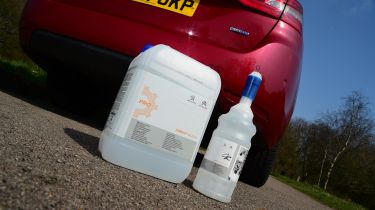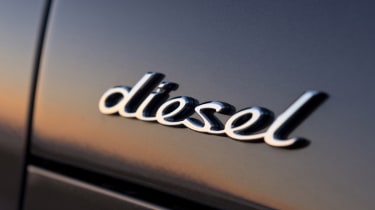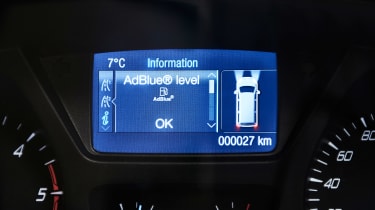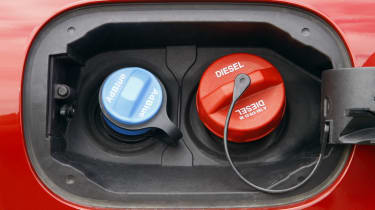What is AdBlue and what does it do? Diesel exhaust fluid explained
AdBlue is used to clean up the exhaust emissions of modern diesel cars – we cover everything you need to know

Diesel exhaust fluid (DEF), often referred to by its trade name AdBlue, is an important fluid for your diesel car. It helps to clean up your car’s exhaust emissions, keeping it running correctly and reducing the pollution created by road traffic.
All diesel cars built from late 2015 onwards are required to use diesel exhaust fluid. It’s a colourless, non-toxic liquid and will need to be refilled periodically. When your diesel car is running low on AdBlue, you might see a warning light illuminate on your dashboard, letting you know that it’s time to top up the tank.
This is important, as your diesel car is unlikely to run correctly if the AdBlue tank is empty. Thankfully, refilling the tank is an easy process to do yourself – we’ve covered how to top up your car’s AdBlue further down.
This guide also explains how AdBlue works, what it’s used for, what happens if your car runs out of AdBlue and where to buy it if you need it.
What does AdBlue do?
While diesels typically emit less carbon dioxide or ‘CO2’ than petrol engines, they tend to produce higher quantities of nitrogen oxides, or ‘NOx’. To put it simply, AdBlue reduces the amount of these harmful nitrogen oxides in your diesel car’s exhaust emissions.
NOx has been proven to negatively impact public health and is a primary driver behind smog and acid rain, so legislation was introduced to cut these emissions from diesel cars. As the solution, AdBlue was made mandatory for diesel cars in September 2015, ensuring compliance with the strict Euro 6 and upcoming Euro 7 emissions regulations. All diesel cars built from this point onwards use AdBlue.

AdBlue is used in the selective catalytic reduction (SCR) system of your diesel car. An injector sprays small amounts of AdBlue into the exhaust system, neutralising harmful emissions through a chemical reaction. This technology has been used in buses and heavy lorries for a long time, so its effectiveness has been proven and its reliability is better than ever.
Every now and then, the AdBlue level will need to be topped up so the SCR system can continue to function correctly. This is usually performed by a service centre during your car’s service, but it’s also possible to do it yourself.
I have an AdBlue warning light, what should I do?
The warning light will come on if the system is running low on AdBlue, but it will give you plenty of warning – you’ll usually be alerted with an AdBlue warning when it’s 1,500 miles from running out, along with an amber warning light. This warning will remain on every time you restart your car until the AdBlue levels have been topped up.
The AdBlue warning light will look slightly different depending on the make and model of your car. Some cars use an icon showing a bottle of fluid, some show an exhaust gas image, while some cars will simply say ‘AdBlue’. If you’re unsure about what a dashboard warning light means, you should check your car’s handbook. Our dashboard waning light guide also explains common symbols and icons.

You shouldn’t wait too long to top up the system as driving with a completely empty AdBlue tank will negatively affect your car’s performance. Without AdBlue, your engine won’t be able to meet emissions standards, so your car’s computer is likely to reduce engine power in an effort to cut emissions another way, or it could even prevent you from starting the engine. You can contact your local service centre to top up your AdBlue level for you, or you can purchase AdBlue and fill up the tank yourself.
How do I refill my AdBlue tank myself?
It should be fairly straightforward to refill your car’s AdBlue tank. On several mainstream diesel models, the AdBlue filler is located behind the car’s fuel filler cap, so you’ve probably already noticed it when filling up with fuel. It’s usually smaller than the main fuel filler, and will feature a blue cap and markings confirming it should only be used for AdBlue. While AdBlue may look like water, do not refill the tank with ordinary tap water – you run the risk of causing damage to the SCR system.
Place a funnel into the filler neck and pour the specified quantity of AdBlue into the tank. The owner’s manual should tell you how much AdBlue to use, as well as how to access the tank if you can’t find the filler neck.

It’s a good idea to ask the seller to show you how to refill the AdBlue during the handover of a new car.
Where can I buy AdBlue?
If you choose to top up your AdBlue yourself, you can purchase it in bottles at fuel stations or you can order it online. It’s worth pointing out that AdBlue has an expiry date and shouldn’t be used beyond this point as it may damage the SCR system, so don’t stock up on huge quantities. Depending on where you buy it, AdBlue isn’t especially expensive, given how infrequently you’re likely to need to top it up – some places sell 10L bottles for around £15.
When buying AdBlue, you should check it meets the correct specification, so look for the ISO 22241 number on the packaging. This may also appear as ISO-22241-1, ISO-22241-2, ISO-22241-3. This will ensure the AdBlue doesn’t damage your car’s SCR catalyst – a costly repair. Assuming your AdBlue meets these specifications, one brand of AdBlue should be pretty much the same as another.
Where can I find an AdBlue pump?
Another option for topping up your AdBlue tank is to use an AdBlue pump. These can be found at most big filling stations in the HGV lanes. Some of the pumps feature a specific fuelling nozzle for HGVs and a different one for cars.
An AdBlue pump is usually used by truckers and is often far cheaper and less messy than trying to top-up your tank from a plastic bottle. The filling stations with AdBlue pumps were originally largely restricted to key routes and motorways but more have been added in recent years.
Can I drive without AdBlue?
Ignoring the AdBlue warning light on your dashboard is not advised under any circumstances. If you run out of AdBlue while driving, you may still be able to drive, but your car’s performance is almost certain to be affected.
Your car will try to reduce its emissions output by going into ‘limp mode.’ This will reduce the speed at which you can drive and sometimes turn off your vehicle’s stereo or air conditioning to preserve power.
Once you’ve stopped, the majority of modern cars cannot be restarted while the AdBlue tank is completely empty. Keep a spare bottle of AdBlue at home to avoid this situation – just make sure it hasn’t expired.
What is AdBlue made of?
AdBlue is a non-toxic liquid that’s colourless in appearance and is essentially a solution of water and urea – a substance found in urine. However, in AdBlue, the urea is exceptionally pure and is of a higher grade than that used in cosmetics, glue or fertilisers. Similarly, the water is demineralised, which is far cleaner than water from the tap.
Does AdBlue affect fuel consumption?
Manufacturers have yet to release any data to suggest that AdBlue has an adverse effect on fuel consumption. Economy figures for a new diesel car on sale in the UK will factor in any effect from the use of AdBlue in any case.
Developments in engine technology, changes to the way economy figures are calculated and a range of other variables means it’s essentially impossible to find differences in fuel consumption between new and older cars and attribute them solely to the use of AdBlue.
AdBlue also doesn’t seem to affect the reliability of cars that use the system – problems only really occur if you let the DEF run out completely, or if you try using fluid that is past its use-by date or of the incorrect specification. In other words, as long as you remember to top up the fluid once it begins running low, you shouldn’t experience any problems or an increase in fuel consumption.
Frequently Asked Questions
AdBlue is part of your diesel car’s emissions system and reduces the amount of harmful NOx gasses in the exhaust.
We've covered the most fuel-efficient cars on sale – read the top 10 list here...
Most Popular
Tips & advice

Car dashboard warning lights: what does each symbol mean?

Electric car charging stations: public networks, charger types, apps and maps






